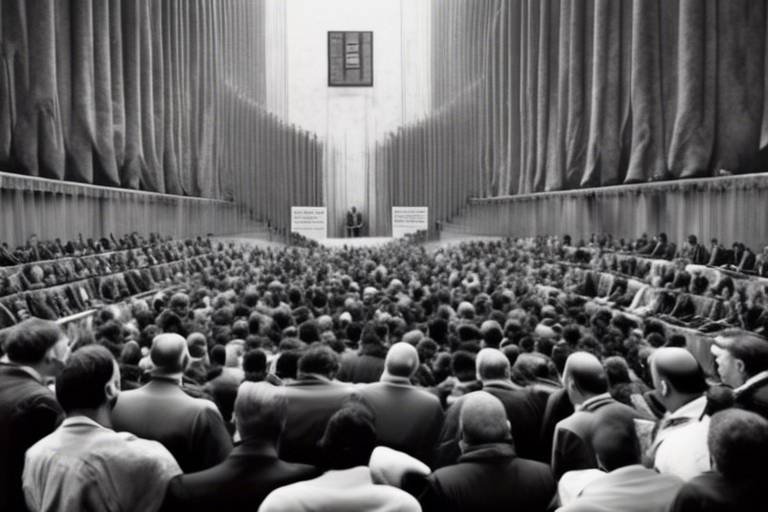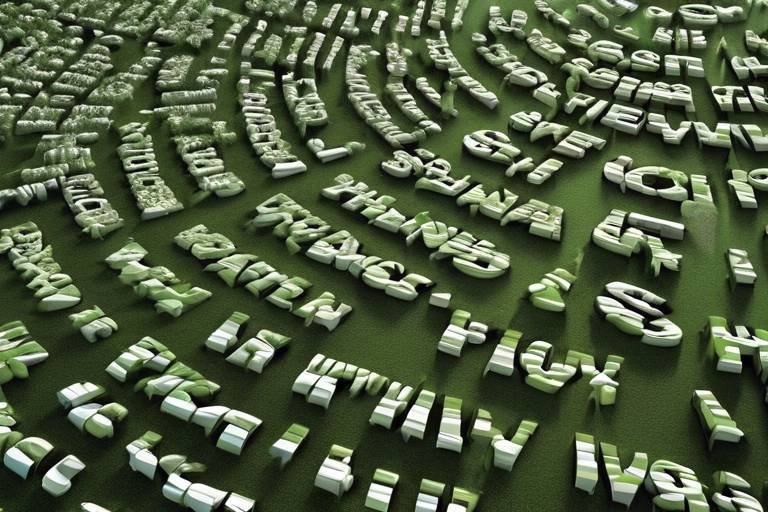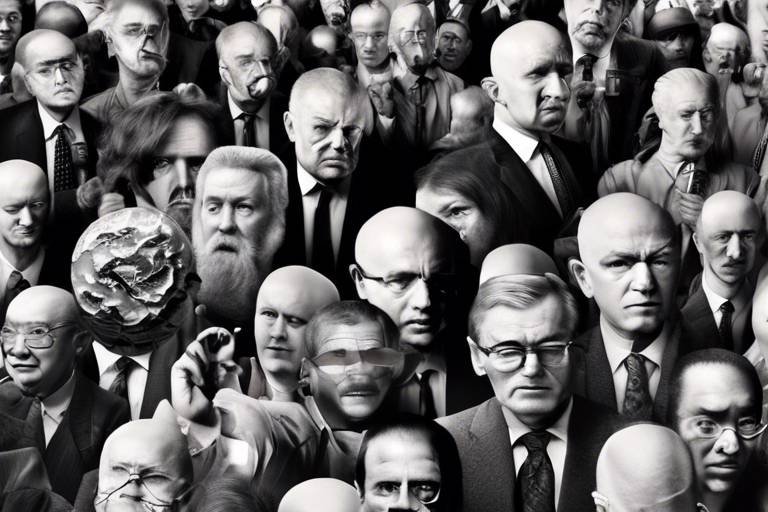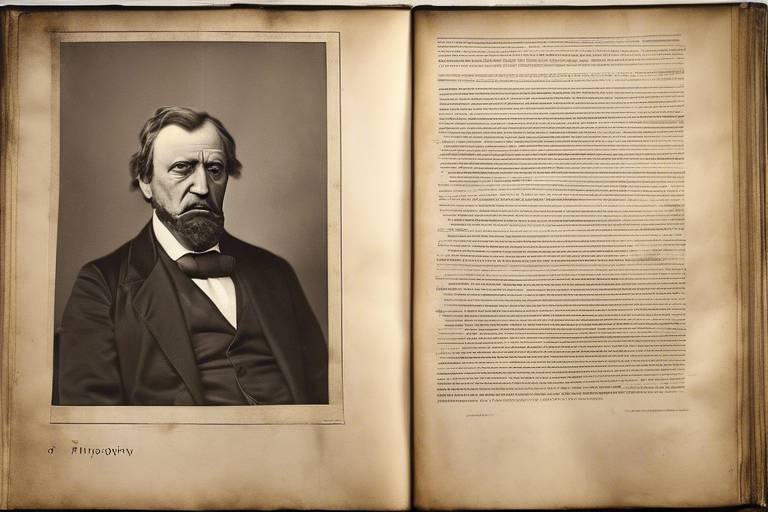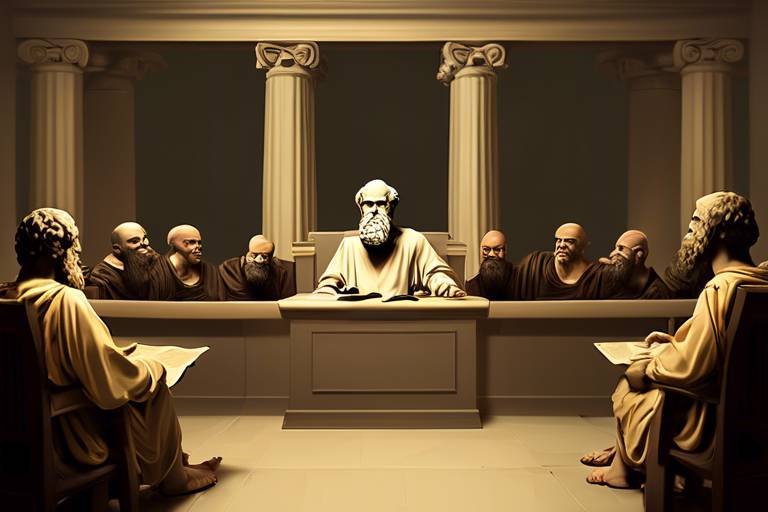Hobbes’s Leviathan in Modern Politics
In an era where political discourse often feels like a chaotic battlefield, the ideas of Thomas Hobbes, particularly as articulated in his seminal work Leviathan, resonate more than ever. Hobbes presents a world where human beings are driven by self-interest, leading to a natural state of conflict and insecurity. This perspective raises critical questions about authority and governance in our contemporary society. Are we truly capable of self-governance, or do we need a strong sovereign to maintain order? As we dive into Hobbes's theories, we uncover their profound implications for modern political structures, social contracts, and the delicate balance between security and freedom.
Hobbes's view of human nature is often summarized as inherently self-interested and competitive. He posits that individuals are driven by a desire for self-preservation, leading to a constant struggle for resources and power. This perspective is not just a relic of philosophical debate; it has tangible implications for how we understand political behavior today. In modern politics, we see this self-interest manifest in various forms, from the actions of politicians to the motivations of voters. For instance, consider how political campaigns often appeal to the electorate's desires and fears, highlighting that Hobbes's insights into human nature remain relevant. The competitive nature of politics can lead to polarization, where parties prioritize their interests over collective well-being, echoing Hobbes's belief that without a strong authority, society would descend into chaos.
At the heart of Hobbes's political philosophy lies the concept of the social contract. This theory posits that individuals consent, either explicitly or implicitly, to surrender some of their freedoms to a sovereign authority in exchange for protection and order. In today's political landscape, the social contract serves as a foundational concept for understanding legitimacy and authority. For instance, when citizens vote or obey laws, they are, in essence, reaffirming their consent to the social contract. However, the question arises: how legitimate is that authority when governments fail to protect their citizens or uphold their rights? This dilemma is at the forefront of contemporary governance, as we witness movements demanding accountability and transparency from those in power.
Hobbes's depiction of the state of nature is particularly striking. He describes it as a place where life is "solitary, poor, nasty, brutish, and short." This bleak vision underscores the necessity of a strong sovereign to maintain peace and security. In modern political conflicts, we can see reflections of this concept. For example, in regions plagued by civil unrest, the absence of effective governance often leads to a breakdown of order, reminiscent of Hobbes's state of nature. The struggle for power among factions can result in chaos, proving that without a strong authority, society risks descending into anarchy.
One of the central themes in Hobbes's work is the tension between security and individual freedom. In today's world, this balance is more crucial than ever. Governments often justify the infringement of personal liberties in the name of national security, prompting debates about the extent to which citizens should sacrifice freedom for safety. The challenge lies in finding a middle ground that preserves individual rights while ensuring collective security. This ongoing struggle is evident in discussions surrounding surveillance, law enforcement practices, and emergency powers, where the question remains: how much freedom are we willing to give up for the promise of security?
While Hobbes's theories may seem at odds with democratic ideals, they also offer a lens through which to examine the complexities of governance. His emphasis on authority and order challenges the notion that democracy is inherently stable. In fact, Hobbes's ideas can be reconciled with democratic principles by recognizing that effective governance requires a balance of power and accountability. As we navigate the challenges of modern democracy, Hobbes's insights remind us that without a strong foundation of authority, even the most well-intentioned democratic systems can falter.
Understanding the role of authority and sovereignty in Hobbes's Leviathan is crucial for grasping modern political structures. Hobbes argues that a sovereign must hold absolute power to maintain peace and prevent conflict. In contemporary governments, we see various forms of authority, from elected officials to unelected bureaucracies. The challenge lies in ensuring that this authority is exercised justly and in the interest of the populace. Moreover, the question of sovereignty is particularly relevant in an increasingly globalized world, where national governments must navigate complex international relations while maintaining their authority.
The influence of Hobbes's Leviathan extends far beyond his time, shaping the thoughts of numerous political theorists throughout history. Thinkers like John Locke and Jean-Jacques Rousseau engaged with Hobbesian concepts, either to build upon or counter his ideas. This ongoing dialogue highlights the enduring relevance of Hobbes's theories in understanding the evolution of political thought. His work has laid the groundwork for discussions on governance, authority, and the nature of human beings, making it a cornerstone of political philosophy.
Hobbes's ideas find application in various contemporary political scenarios, from governance challenges to international relations. For instance, in discussions about state power, we often refer back to Hobbes's notion of the social contract to evaluate the legitimacy of government actions. Additionally, as we face global challenges such as climate change and pandemics, the need for strong, decisive leadership—akin to Hobbes's sovereign—becomes apparent. The interplay between state authority and individual rights continues to be a hot topic, reflecting the ongoing relevance of Hobbesian thought in modern political discourse.
While Hobbes's theories have significantly shaped political thought, they have not gone without criticism. Detractors argue that his bleak view of human nature is overly pessimistic and fails to account for altruism and cooperation. Moreover, some contend that his advocacy for absolute authority can lead to tyranny and oppression. These critiques are essential to consider, as they highlight the complexities of human behavior and governance. In modern political philosophy, the challenge remains to balance Hobbes's insights with a more optimistic view of human potential, paving the way for a more nuanced understanding of authority and freedom.
- What is the main idea of Hobbes's Leviathan? Hobbes's Leviathan argues that humans are naturally self-interested and that a strong sovereign is necessary to maintain order and prevent chaos.
- How does Hobbes's social contract theory apply today? The social contract theory underlies modern governance, emphasizing the consent of the governed and the legitimacy of authority.
- What is the significance of the state of nature in Hobbes's work? The state of nature illustrates the necessity of a powerful authority to ensure peace and security, reflecting the potential for conflict in the absence of governance.
- How do Hobbes's ideas relate to democracy? While Hobbes's theories challenge democratic ideals, they also highlight the need for authority and stability in governance.

Leviathan
This article explores the relevance of Hobbes's in contemporary political discourse, analyzing its implications for authority, governance, and social contracts in today's political landscape.
Hobbes's view of human nature as self-interested and competitive shapes his political theories. This section examines how these ideas influence modern political thought and behavior.
Hobbes's social contract theory serves as a foundational concept in political philosophy. This section discusses its implications for legitimacy and authority in contemporary governance.
Hobbes's depiction of the state of nature underlines the necessity of a strong sovereign. This subheading explores how this concept is reflected in modern political conflicts.
The balance between security and individual freedom is a central theme in Hobbes's work. This section examines how modern states navigate this tension in policy-making.
Hobbes's ideas challenge the foundations of democratic governance. This part discusses how his theories can be reconciled with democratic principles in modern contexts.
The role of authority and sovereignty in Hobbes's is crucial for understanding modern political structures. This section analyzes how these concepts manifest in today's governments.
Hobbes's has significantly influenced political theorists throughout history. This section reviews key thinkers who have drawn on Hobbesian concepts in their own work.
This subheading explores how Hobbes's ideas are applied in contemporary political scenarios, including issues of governance, international relations, and state power.
While influential, Hobbes's theories have faced criticism. This section discusses various critiques and their implications for modern political philosophy.
The term not only refers to Hobbes's seminal work but also symbolizes the overarching power of the state. In the book, Hobbes argues that in order to escape the chaos of the state of nature, individuals collectively agree to form a society governed by a powerful sovereign. This sovereign, whether an individual or an assembly, is endowed with the authority to enforce laws and maintain order. The implications of this idea are profound, as it suggests that the legitimacy of government derives from the consent of the governed, albeit under the condition that this government possesses sufficient power to maintain peace and security.
In contemporary politics, the concept of the Leviathan can be seen in various forms, from authoritarian regimes to democratic governments that prioritize security over individual freedoms. For instance, consider how governments implement surveillance measures in the name of national security. This raises the question: at what point does the need for security infringe upon personal liberties? Hobbes would argue that a strong authority is necessary to prevent the descent into chaos, yet this very authority can become a source of oppression if unchecked.
Moreover, Hobbes's ideas resonate in debates surrounding social contracts today. Modern political discourse often grapples with the balance between collective responsibility and individual rights. In a world facing global challenges such as climate change and pandemics, the need for a strong, coordinated response can echo Hobbesian thought. However, the challenge lies in ensuring that such authority does not overreach, thereby preserving the democratic ideals of freedom and participation.
- What is the main idea of Hobbes's Leviathan?
Hobbes's presents the idea that a strong central authority is necessary to prevent chaos and maintain social order, arguing that individuals must surrender some freedoms for the sake of security.
- How does Hobbes view human nature?
Hobbes views human nature as inherently self-interested and competitive, leading to conflict in the absence of a powerful governing authority.
- What is the significance of the social contract in Hobbes's theory?
The social contract is crucial as it establishes the legitimacy of the sovereign's authority, based on the consent of the governed to create a structured society.
- How does Hobbes's Leviathan relate to modern governance?
Hobbes's ideas continue to influence modern governance, particularly in discussions about the balance between security and individual freedoms, as well as the role of authority in society.

in contemporary political discourse, analyzing its implications for authority, governance, and social contracts in today's political landscape.
This article explores the relevance of Hobbes's Leviathan in contemporary political discourse, analyzing its implications for authority, governance, and social contracts in today's political landscape.
Hobbes's view of human nature as self-interested and competitive shapes his political theories. This section examines how these ideas influence modern political thought and behavior.
Hobbes's social contract theory serves as a foundational concept in political philosophy. This section discusses its implications for legitimacy and authority in contemporary governance.
Hobbes's depiction of the state of nature underlines the necessity of a strong sovereign. This subheading explores how this concept is reflected in modern political conflicts.
The balance between security and individual freedom is a central theme in Hobbes's work. This section examines how modern states navigate this tension in policy-making.
Hobbes's ideas challenge the foundations of democratic governance. This part discusses how his theories can be reconciled with democratic principles in modern contexts.
The role of authority and sovereignty in Hobbes's Leviathan is crucial for understanding modern political structures. This section analyzes how these concepts manifest in today's governments.
Hobbes's Leviathan has significantly influenced political theorists throughout history. This section reviews key thinkers who have drawn on Hobbesian concepts in their own work.
This subheading explores how Hobbes's ideas are applied in contemporary political scenarios, including issues of governance, international relations, and state power.
While influential, Hobbes's theories have faced criticism. This section discusses various critiques and their implications for modern political philosophy.
In the whirlwind of today's political climate, the echoes of Hobbes's Leviathan resonate with startling clarity. His exploration of authority, governance, and the social contract remains strikingly relevant. Imagine the political landscape as a vast ocean; Hobbes's ideas act as the lighthouse guiding us through turbulent waters. His assertion that humans are fundamentally self-interested beings compels us to examine our leaders and institutions critically. Are they truly acting in the public's best interest, or are they merely serving their own agendas?
At the heart of Hobbes's theory is the concept of the social contract, a foundational idea that continues to shape modern governance. In today's world, where trust in political institutions often wavers, the social contract serves as a reminder of the implicit agreement between the governed and the governing. Citizens expect protection and order in exchange for their compliance and allegiance. However, when that contract is perceived to be broken—be it through corruption, ineptitude, or authoritarian overreach—the very fabric of society can unravel. This tension raises critical questions: How do we hold our leaders accountable? What mechanisms are in place to ensure that the social contract is upheld?
Moreover, Hobbes's insistence on the necessity of a strong sovereign to maintain order is particularly poignant in the face of modern political conflicts. With rising populism and political polarization, the call for strong leadership has become a rallying cry for many. Yet, this leads to a paradox: while we seek stability and security, we must also guard against the erosion of our freedoms. The challenge lies in striking a balance between these two competing ideals—an endeavor that is as complex as it is essential.
To illustrate this balance, consider the following table that outlines the contrasting elements of security and freedom in governance:
| Security | Freedom |
|---|---|
| Protection from external threats | Autonomy in personal choices |
| Order and stability | Right to dissent and protest |
| Law enforcement and regulations | Privacy and civil liberties |
As we navigate these waters, it becomes increasingly clear that Hobbes's insights into authority and governance challenge us to rethink our democratic ideals. Can we reconcile the need for a strong authority with the principles of democracy? Or do we risk sacrificing our freedoms on the altar of security? These questions are not merely academic; they are the very essence of our political discourse today.
- What is Hobbes's main argument in Leviathan? Hobbes argues for a strong, centralized authority to prevent chaos and conflict among self-interested individuals.
- How does Hobbes's view of human nature influence his political theories? He believes that humans are inherently competitive and self-serving, which necessitates a powerful sovereign to maintain order.
- What is the social contract theory? It is the idea that individuals consent, either explicitly or implicitly, to surrender some freedoms in exchange for protection and order provided by a governing body.
- Are Hobbes's ideas still relevant today? Yes, his concepts of authority, governance, and the social contract continue to influence modern political thought and practice.

The Nature of Human Beings
When we dive into the philosophical depths of Hobbes's view on human nature, we uncover a rather stark and, at times, unsettling perspective. Hobbes famously posited that humans are inherently self-interested and competitive. This belief forms the bedrock of his political theories and serves as a critical lens through which we can analyze modern political behaviors and structures. But why does this matter today? In a world where political polarization and social unrest seem to dominate the headlines, understanding Hobbes's take on human nature can provide us with valuable insights into the motivations behind political actions and decisions.
Hobbes described a world where individuals are driven primarily by their own desires and fears, leading to a state of constant competition. Imagine a bustling marketplace where everyone is trying to outdo one another—this is akin to Hobbes's vision of human interactions. In such a scenario, trust becomes a rare commodity, and the fear of betrayal looms large. This perspective challenges the more optimistic views of human nature often found in contemporary political discourse, which tend to emphasize cooperation and altruism. Instead, Hobbes's lens compels us to ask: Are we truly capable of selflessness, or is it merely a facade?
Moreover, Hobbes's assertion that life in the state of nature is "solitary, poor, nasty, brutish, and short" highlights the necessity of a strong governing authority to maintain order and protect individuals from their baser instincts. In modern politics, this idea resonates in discussions about law enforcement, national security, and the role of government in regulating behavior. As we navigate through contemporary issues—such as crime rates and civil liberties—the tension between individual rights and societal order often mirrors Hobbes's theories.
To illustrate, consider the following implications of Hobbes's view on human nature in today's political landscape:
- Political Polarization: The self-interested nature of humans can lead to factions and divisions within society, as individuals align with groups that reflect their own interests.
- Trust in Governance: If people inherently distrust one another, they may also be skeptical of governmental institutions, leading to calls for increased transparency and accountability.
- Social Contracts: Hobbes's ideas underpin the modern concept of the social contract, where citizens agree to surrender some freedoms in exchange for protection and order.
In essence, Hobbes's portrayal of human beings as self-interested actors provides a crucial framework for understanding the complexities of modern political behavior. It forces us to confront uncomfortable truths about our motivations and the structures we create to manage them. As we grapple with political challenges today, we must ask ourselves: How do these foundational beliefs shape our governance and societal interactions?

The Social Contract Theory
When we dive into Hobbes's social contract theory, we're not just wading through dusty old texts; we're exploring a foundational concept that has shaped the very fabric of political philosophy. Hobbes proposed that in order to escape the chaos of the "state of nature," individuals come together to form a social contract. This contract is an implicit agreement where people surrender some of their freedoms and submit to the authority of a sovereign in exchange for security and order. But what does this mean for us in the modern world?
In today’s political landscape, the idea of a social contract remains incredibly relevant. It raises questions about the legitimacy of authority and the expectations citizens have of their governments. For instance, we often hear debates about whether governments are fulfilling their end of the social contract. Are they providing adequate security? Are they protecting individual freedoms? These questions echo Hobbes's original concerns about the balance between authority and the rights of the governed.
Moreover, the social contract theory is not just a relic of the past; it serves as a lens through which we can analyze contemporary governance. Take a look at how various political systems operate around the globe. In some countries, the social contract seems to be thriving, with governments actively engaging with citizens and ensuring their rights are upheld. In contrast, in other regions, the social contract appears to be breaking down, leading to unrest and calls for reform.
To illustrate this further, let’s consider a few key elements of the social contract theory as they apply to modern governance:
| Element | Modern Implication |
|---|---|
| Legitimacy | Governments must be seen as legitimate to maintain order and compliance. |
| Authority | Citizens grant authority to the state, but this authority can be challenged. |
| Rights | Citizens have rights that must be protected by the government. |
| Responsibility | Governments are responsible for ensuring the welfare of their citizens. |
This table highlights how Hobbes's ideas about the social contract continue to influence our understanding of governance today. The essence of the social contract is that it is a two-way street. While citizens agree to abide by laws and regulations, governments are expected to uphold their end of the bargain by providing for the common good.
In conclusion, Hobbes's social contract theory invites us to reflect on our own political systems and the expectations we have of our leaders. As we navigate the complexities of modern governance, it is essential to keep in mind the delicate balance between authority and individual rights, a balance that Hobbes articulated centuries ago but remains relevant in our contemporary discussions about power, legitimacy, and the role of the state.
- What is the social contract theory? The social contract theory is a political concept that suggests individuals consent, either explicitly or implicitly, to surrender some freedoms in exchange for protection and order provided by a governing authority.
- How does Hobbes's view differ from other social contract theorists? Hobbes viewed human nature as inherently self-interested and competitive, leading to the necessity of a strong sovereign. In contrast, other theorists, like Rousseau, believed humans are naturally good and that society corrupts them.
- Why is the social contract relevant today? The social contract remains relevant as it prompts discussions about the legitimacy of governments, citizens' rights, and the responsibilities of authorities in modern political contexts.

State of Nature
In Hobbes's view, the is a chaotic and violent realm where human beings, driven by their innate self-interest and competitive instincts, exist in a constant state of conflict. Imagine a world where every individual is pitted against the other, where trust is a rare commodity, and survival hinges on cunning and brute strength. This bleak depiction serves as a powerful backdrop for Hobbes's argument that a strong, centralized authority is essential for peace and order. In today’s political landscape, we can see echoes of this notion, particularly in regions plagued by instability and strife.
Hobbes believed that without a governing authority, life would be “solitary, poor, nasty, brutish, and short.” This assertion raises a critical question: if human beings are inherently self-serving, how can societies function harmoniously? The answer lies in the establishment of a social contract, where individuals collectively agree to surrender some of their freedoms in exchange for security and order. In modern politics, this concept is not just theoretical; it is reflected in the ongoing debates about governance, authority, and the role of the state in protecting its citizens.
When we look at contemporary conflicts, we can identify situations that resonate with Hobbes's state of nature. For instance, in areas where government authority is weak or absent, such as war-torn regions or failed states, we often witness a breakdown of social order. Here, the 'war of all against all' becomes a reality, forcing individuals to fend for themselves in a dangerous environment. This leads to the emergence of local warlords or militias, which can be seen as a crude form of authority that attempts to restore some semblance of order, albeit through coercion and violence.
To better understand how Hobbes's ideas apply today, we can consider the following examples:
- In regions where the government has collapsed, like parts of Syria and Somalia, we see the true essence of Hobbes's state of nature come to life.
- The rise of extremist groups often fills the power vacuum left by ineffective governments, illustrating the desperation for authority in chaotic environments.
- Even in stable societies, the tension between individual freedoms and the need for security can lead to policies that echo Hobbesian thought, such as increased surveillance or military intervention in crises.
Ultimately, Hobbes's portrayal of the state of nature is not merely a historical curiosity; it serves as a lens through which we can analyze the complexities of modern governance. As we navigate the intricate balance between authority and individual rights, Hobbes's insights remind us of the fragile nature of social order and the constant need for a governing body that can enforce peace and stability. In an era where political discourse often swings between calls for freedom and demands for security, revisiting Hobbes's theories can provide valuable perspectives on the challenges we face today.

Security vs. Freedom
In the realm of political philosophy, the tension between security and freedom is a fundamental theme, deeply embedded in the works of Thomas Hobbes. He famously posited that in the absence of a strong, centralized authority, humanity would revert to a chaotic state of nature, where life would be "solitary, poor, nasty, brutish, and short." This dire depiction raises an essential question: Is it worth sacrificing individual freedoms for the sake of security? In modern politics, this dilemma is more relevant than ever, as governments grapple with the need to protect citizens while also respecting their rights.
Hobbes argued that to escape the anarchic state of nature, individuals collectively agree to surrender some of their freedoms to a sovereign power. This trade-off is meant to ensure peace and security, but it inevitably leads to a complex balancing act. For instance, consider the post-9/11 world, where many countries have implemented extensive security measures. These measures, while aimed at protecting citizens, often encroach upon personal liberties. Surveillance programs, travel restrictions, and anti-terrorism laws are just a few examples where the scales have tipped toward security at the potential expense of individual rights.
However, this balance is not a one-size-fits-all solution. Different societies approach the security-freedom dichotomy in varying ways, influenced by cultural values, historical contexts, and political ideologies. For instance, in democratic nations, the emphasis is often placed on safeguarding personal freedoms, but this can lead to debates about how much security is necessary. On the other hand, authoritarian regimes may prioritize security to the extent that they curtail freedoms, justifying their actions as necessary for the greater good.
To better understand this dynamic, we can look at a few key factors that influence the security-freedom balance:
- Public Perception: How citizens perceive threats can heavily influence governmental policies. In times of crisis, people may be more willing to accept restrictions on their freedoms.
- Political Climate: The nature of the political system can dictate how security measures are implemented. In democracies, there are often checks and balances, while authoritarian regimes may impose measures unilaterally.
- Technological Advancements: The rise of technology has transformed how security is enforced and monitored, raising new questions about privacy and state control.
Ultimately, the question remains: how do we ensure that security measures do not infringe upon our fundamental freedoms? This is where Hobbes's insights can still guide contemporary discussions. His recognition of the need for a strong authority is crucial, but it must be tempered with accountability and respect for individual rights. The challenge lies in creating a political environment where security does not come at the cost of freedom, allowing citizens to feel safe while also being free to express themselves.
- What is the primary conflict between security and freedom? The primary conflict lies in the need for safety from threats versus the desire for individual liberties and personal autonomy.
- How does Hobbes's view influence modern governance? Hobbes's view emphasizes the necessity of a powerful authority to maintain order, which can sometimes lead to the prioritization of security over freedom in governance.
- Can security and freedom coexist? Yes, but it requires careful balance and constant dialogue about the rights of individuals versus the needs of society.

Implications for Democracy
When we dive into Hobbes's Leviathan, it’s like peeling back the layers of an onion to reveal the complex relationship between authority and democracy. Hobbes presents a rather stark view of human nature, suggesting that individuals are inherently self-interested and competitive. This perspective raises some intriguing questions about how we perceive democratic governance today. Can true democracy exist in a world where individuals are primarily motivated by personal gain? Or does the need for a strong sovereign, as Hobbes suggests, undermine the very essence of democratic principles?
One of the most significant implications of Hobbes's theories for modern democracy is the tension between authority and individual freedom. Hobbes argues that to escape the chaos of the state of nature, individuals must surrender some of their freedoms to a central authority. This idea can be troubling when we consider the democratic ideal of empowering the individual. How do we balance the need for security—a concept that Hobbes champions—with the fundamental rights and freedoms that democracy promises? It’s a delicate dance, much like walking a tightrope where one misstep could lead to a fall into authoritarianism.
Moreover, Hobbes's emphasis on a strong sovereign can challenge the legitimacy of democratic institutions. In a modern context, we often see governments justifying their actions in the name of security, which can lead to an erosion of civil liberties. For instance, in times of crisis, such as during a pandemic or a national emergency, governments may impose restrictions that, while aimed at protecting citizens, can also infringe upon democratic freedoms. This raises a critical question: At what point does the quest for security compromise the democratic values we hold dear?
To illustrate this point, consider the following table that summarizes the tension between security and freedom in democratic societies:
| Aspect | Security | Freedom |
|---|---|---|
| Definition | Protection from harm and chaos | Autonomy and individual rights |
| Hobbes's View | Essential for social order | Must be limited for stability |
| Modern Implications | Increased surveillance, emergency powers | Potential for civil rights violations |
As we reflect on these dynamics, it becomes clear that Hobbes's insights can enrich our understanding of democracy. His work compels us to critically evaluate how we define authority and legitimacy in our political systems. Are we willing to accept a certain level of authoritarianism in exchange for security, or do we believe that democracy can thrive without compromising individual freedoms? These questions are not just academic; they resonate in our daily lives, influencing how we engage with our governments and the policies they enact.
In conclusion, the implications of Hobbes's Leviathan for democracy are profound and multifaceted. They challenge us to consider the balance between authority and freedom, pushing us to question the very foundations of our political beliefs. As we navigate the complexities of modern governance, Hobbes's theories remind us that democracy is not just about the presence of elections or institutions, but about the ongoing struggle to maintain a delicate balance between security and liberty.
- What is Hobbes's main argument in Leviathan? Hobbes argues that in the absence of a strong central authority, human beings will descend into chaos and violence, necessitating a social contract to ensure peace and security.
- How does Hobbes's view of human nature affect modern politics? His view suggests that self-interest drives political behavior, which can lead to conflicts and challenges in achieving true democratic governance.
- Can Hobbes's ideas be reconciled with democratic principles? Yes, but it requires a careful balance between ensuring security and protecting individual freedoms, a challenge that modern democracies continually face.

Authority and Sovereignty
In the realm of political philosophy, the concepts of authority and sovereignty are not merely academic; they are the bedrock upon which modern states are built. Hobbes’s Leviathan presents a compelling argument for the necessity of a powerful sovereign to maintain order and prevent chaos. But what does this mean for today's political landscape? As we navigate through the complexities of governance, understanding these concepts becomes crucial.
Hobbes posited that in the absence of a strong authority, human beings would descend into a state of nature, characterized by anarchy and violence. This bleak view of humanity suggests that individuals are primarily driven by self-interest, which can lead to conflict when left unchecked. Thus, the establishment of a sovereign authority is essential for ensuring peace and stability. In modern contexts, we see this reflected in the way governments operate, often asserting their power to maintain order even when it may infringe upon individual liberties.
Authority, in Hobbesian terms, is not just about having power; it is about having the legitimacy to wield that power. This legitimacy arises from the social contract, where individuals consent to surrender some of their freedoms in exchange for protection and order. But can we fully trust our governments to act in our best interests? This question looms large as we witness various governments grappling with issues of legitimacy in the face of public dissent and demands for accountability.
Moreover, the concept of sovereignty has evolved significantly since Hobbes's time. Today, we live in a world where globalization challenges traditional notions of state sovereignty. International organizations and treaties often supersede national laws, leading to a complex interplay between local authority and global governance. For instance, consider how climate change agreements necessitate cooperation between sovereign states, often requiring them to cede some degree of authority to international bodies.
To illustrate this dynamic, let’s take a look at a simple table that outlines the key differences between Hobbesian sovereignty and modern interpretations:
| Aspect | Hobbesian Sovereignty | Modern Sovereignty |
|---|---|---|
| Source of Authority | Absolute power of the sovereign | Shared power among multiple entities |
| Nature of Governance | Autocratic | Democratic and participatory |
| Response to Global Issues | Isolationist | Collaborative and multilateral |
This table highlights how the rigid structures of Hobbes's time contrast sharply with the fluid and interconnected nature of modern governance. While Hobbes advocated for a singular authority to maintain order, today’s political realities demand a more nuanced approach to authority and sovereignty, one that accommodates the complexities of a globalized world.
In conclusion, understanding the interplay between authority and sovereignty is vital for grasping the challenges of contemporary governance. As we continue to confront issues such as national security, human rights, and global cooperation, Hobbes’s insights remain relevant. They compel us to ask critical questions about the nature of power, the legitimacy of authority, and how we, as citizens, engage with the structures that govern our lives.

Influence on Political Thought
Hobbes's Leviathan has left an indelible mark on the landscape of political thought, shaping the way we comprehend authority, governance, and the very fabric of society. His ideas resonate through the ages, influencing not just his contemporaries but also countless generations of political theorists who have grappled with the implications of his work. To understand the depth of Hobbes's influence, we must explore how his concepts have been embraced, adapted, and critiqued over time.
One of the most significant aspects of Hobbes's influence lies in his portrayal of the state of nature and the necessity of a social contract. The notion that humans are inherently self-interested and that chaos reigns in a state of nature has prompted political thinkers to consider the foundations of authority and governance. This perspective has been pivotal in the development of various political ideologies, from liberalism to authoritarianism. For instance, John Locke, a prominent Enlightenment thinker, engaged with Hobbes's ideas by proposing a more optimistic view of human nature, suggesting that people could coexist peacefully without a powerful sovereign. Yet, even Locke's theories were shaped in response to Hobbes's stark depiction of humanity.
Moreover, Hobbes's ideas about sovereignty have sparked debates that continue to this day. His assertion that a strong, centralized authority is essential to prevent societal collapse has been a cornerstone for many political systems. This has led to discussions about the legitimacy of power and the role of the state in ensuring security. In modern democracies, where the balance between freedom and authority is constantly negotiated, Hobbes's thoughts serve as a reminder of the potential dangers of unchecked liberty. The tension between individual rights and collective security is a recurring theme in political discourse, reflecting Hobbes's enduring relevance.
In addition to influencing individual thinkers, Hobbes's Leviathan has also shaped broader political movements. The rise of social contract theories in the 17th and 18th centuries can be traced back to his work, with many theorists building upon or reacting against his ideas. For example, Jean-Jacques Rousseau took Hobbes's social contract and infused it with a sense of moral obligation and collective will, arguing that true freedom is found in the general will of the people. This evolution of thought demonstrates how Hobbes's foundational concepts have been reinterpreted and adapted to fit new contexts and ideologies.
Furthermore, Hobbes's impact extends beyond Western political thought. His ideas have crossed cultural boundaries, influencing political philosophers in various regions. In the realm of international relations, Hobbesian concepts are often invoked to describe the anarchic nature of the global system, where states act in their self-interest much like individuals in the state of nature. This perspective has shaped realist theories in international relations, emphasizing power dynamics and the necessity of strong leadership.
As we delve deeper into the implications of Hobbes's work, it becomes clear that his influence is both profound and multifaceted. The questions he raised about authority, governance, and human nature continue to challenge and inspire scholars and practitioners alike. In a world where political landscapes are constantly evolving, the lessons from Hobbes's Leviathan remain remarkably pertinent, urging us to reflect on the delicate balance between security and freedom, authority and individual rights.
- What is the main idea of Hobbes's Leviathan? Hobbes's Leviathan argues that in order to escape the chaos of the state of nature, individuals must enter into a social contract and submit to a powerful sovereign authority.
- How did Hobbes influence modern political thought? Hobbes's depiction of human nature and the necessity of a social contract has shaped various political ideologies and remains a foundational concept in discussions of authority and governance.
- What are the critiques of Hobbesian theory? Critics argue that Hobbes's view of human nature is overly pessimistic and that his advocacy for absolute authority can lead to tyranny.

Contemporary Applications
Hobbes's ideas, particularly those outlined in his seminal work Leviathan, continue to resonate in today's political landscape, shaping how we understand governance, authority, and the social contract. In a world where political systems are constantly evolving, the relevance of Hobbes's theories can be seen in various contemporary applications. For instance, the concept of a strong sovereign, as proposed by Hobbes, can be observed in the way modern states respond to crises, whether they be economic downturns, public health emergencies, or national security threats.
Take, for example, the global response to the COVID-19 pandemic. Governments around the world had to make swift decisions to impose lockdowns and enforce regulations aimed at protecting public health. In many cases, these actions were justified by the need to ensure the safety and security of citizens, echoing Hobbes's assertion that a powerful authority is necessary to maintain order. This situation raises an intriguing question: how far should a government go in the name of security? Hobbes would likely argue that the sacrifice of some individual freedoms is a small price to pay for the greater good of societal stability.
Moreover, Hobbes's insights into the nature of human beings as self-interested actors provide a useful lens through which to analyze contemporary political behavior. In the realm of international relations, the concept of the "state of nature" can be applied to understand the competitive dynamics between nations. Countries often act in their own self-interest, seeking to maximize their power and influence, which can lead to conflicts and alliances that mirror Hobbesian theory. For instance, the ongoing tensions between major powers can be seen as a struggle for dominance in a world where the absence of a global sovereign leads to a chaotic and often dangerous environment.
In addition, Hobbes's social contract theory continues to inform discussions about legitimacy and authority in modern democracies. Citizens enter into a social contract with their governments, granting them authority in exchange for protection and the maintenance of order. However, the question arises: what happens when that social contract is perceived to be broken? Recent protests and movements advocating for civil rights and social justice illustrate how citizens are increasingly willing to challenge authority when they feel their rights are being compromised. This reflects a shift in the balance of power between the governed and their rulers, showcasing the ongoing relevance of Hobbes's ideas.
Furthermore, the rise of populism in various parts of the world can be viewed through a Hobbesian lens. Populist leaders often position themselves as the strong sovereigns who promise to restore order and security amidst perceived chaos. They appeal to the self-interested nature of individuals, tapping into fears and anxieties to gain support. This dynamic raises critical questions about the nature of authority and the role of the state in contemporary society. Are these leaders truly embodying Hobbes's vision of a sovereign, or are they manipulating the concepts for their own gain?
In conclusion, Hobbes's Leviathan remains a vital framework for understanding contemporary political issues. From the necessity of strong governance in times of crisis to the implications of self-interest in international relations, his theories provide valuable insights into the complexities of modern politics. As we navigate an increasingly turbulent political landscape, revisiting Hobbes's work can illuminate the challenges and opportunities that lie ahead.
- What is Hobbes's main argument in Leviathan? Hobbes argues that in the absence of a strong sovereign, human beings exist in a state of nature characterized by chaos and conflict, necessitating a social contract to ensure peace and security.
- How does Hobbes's view of human nature influence modern politics? Hobbes’s perspective that humans are inherently self-interested and competitive informs contemporary political behavior, particularly in how states interact with one another.
- What are the implications of Hobbes's social contract theory for democracy? While Hobbes’s theories may seem at odds with democratic principles, they highlight the importance of legitimacy and authority in governance, prompting discussions about the balance of power between citizens and the state.

Critiques of Hobbesian Theory
While Thomas Hobbes's Leviathan has been a cornerstone of political philosophy, it has not escaped scrutiny. Critics have raised several points that challenge the validity and applicability of his theories in today's world. One of the most prominent critiques revolves around his pessimistic view of human nature. Hobbes posited that humans are inherently self-interested and competitive, a perspective that many argue oversimplifies the complexity of human behavior. In reality, people often act altruistically and cooperatively, especially in communal settings. This critique suggests that Hobbes's framework may not adequately account for the nuances of human interactions and the potential for collective good.
Another significant point of contention is Hobbes's concept of the social contract. Critics argue that Hobbes's idea that individuals must surrender their rights to a sovereign authority in exchange for security can lead to authoritarianism. They contend that this perspective undermines the very essence of individual freedom and autonomy. In contemporary society, where democratic principles are highly valued, many believe that a more balanced approach to governance should allow for greater public participation and accountability, rather than an absolute submission to authority.
Furthermore, Hobbes's depiction of the state of nature—a chaotic scenario where life is "solitary, poor, nasty, brutish, and short"—has been contested. Critics like John Locke argue that the state of nature is not inherently violent and that humans are capable of forming societies based on mutual respect and cooperation. This critique raises questions about Hobbes's justification for a powerful sovereign, suggesting that a more optimistic view of human nature could lead to different forms of governance that prioritize individual rights and democratic engagement.
Additionally, Hobbes's theories have been criticized for their implications on modern democracy. His emphasis on a strong, centralized authority can clash with democratic ideals that promote decentralization and pluralism. In essence, while Hobbes advocates for a sovereign that maintains order, critics argue that this can stifle dissent and undermine the democratic process. The challenge lies in reconciling Hobbesian principles with the need for democratic governance that respects individual freedoms while ensuring social order.
In summary, while Hobbes's Leviathan offers valuable insights into authority and governance, it is essential to address the critiques surrounding his theories. The ongoing dialogue between Hobbesian thought and contemporary political philosophy highlights the need for a nuanced understanding of human nature, authority, and the complexities of social contracts. By engaging with these critiques, we can better navigate the challenges of modern governance and strive for systems that balance security with individual freedoms.
- What is the main critique of Hobbes's view on human nature?
Critics argue that Hobbes's perspective is overly pessimistic and does not account for the capacity for altruism and cooperation among humans. - How does Hobbes's social contract theory conflict with modern democratic principles?
Hobbes's theory suggests that individuals must surrender their rights to a sovereign, which can lead to authoritarianism and undermine individual freedoms. - What alternative views challenge Hobbes's state of nature?
Thinkers like John Locke propose that the state of nature can be peaceful and cooperative, contrasting Hobbes's chaotic depiction. - Can Hobbesian theory be reconciled with democratic governance?
While challenging, it is possible to find a balance that respects individual rights while maintaining social order.
Frequently Asked Questions
- What is Hobbes's view of human nature?
Hobbes believed that human beings are inherently self-interested and competitive. This perspective shapes his political theories, suggesting that without a powerful authority, society would descend into chaos. In modern politics, this view can help explain why some individuals prioritize personal gain over collective well-being.
- How does Hobbes's social contract theory apply today?
Hobbes's social contract theory is foundational in understanding governance and authority. It posits that individuals consent to surrender some freedoms to a sovereign power in exchange for security and order. This concept remains relevant, as contemporary governments still operate on the premise of social contracts, where citizens accept laws and regulations for the sake of societal stability.
- What does Hobbes mean by the "state of nature"?
The "state of nature" refers to a hypothetical condition where there is no political authority, leading to a life that Hobbes described as "solitary, poor, nasty, brutish, and short." This idea underscores the necessity of a strong sovereign to maintain peace and prevent conflict, a concept that resonates in today's discussions about governance and law enforcement.
- How do Hobbes's ideas relate to security and freedom?
Hobbes emphasizes the tension between security and individual freedom. He argues that while a strong sovereign is necessary for security, it can also limit personal liberties. Modern states often grapple with this balance, making policy decisions that aim to enhance security without overly infringing on individual rights.
- Can Hobbesian theory coexist with democratic principles?
While Hobbes's ideas challenge certain democratic ideals, they can be reconciled with them. For instance, the need for authority and order can coexist with democratic governance, as long as the sovereign power is accountable to the people. This ongoing dialogue is essential in contemporary political philosophy.
- Who has been influenced by Hobbes's Leviathan?
Many political theorists and philosophers have drawn from Hobbes's work, including John Locke, Jean-Jacques Rousseau, and more modern thinkers. Each has built upon or reacted to Hobbesian concepts, shaping the evolution of political thought throughout history.
- What are some contemporary applications of Hobbes's ideas?
Hobbes's theories are applicable in various modern contexts, such as international relations and state power dynamics. His insights into authority and governance can help analyze current political issues, including debates over national security, civil liberties, and the role of government in citizens' lives.
- What critiques exist against Hobbesian theory?
Hobbes's theories have faced criticism for being overly pessimistic about human nature and for justifying authoritarianism. Critics argue that his views may undermine the potential for cooperation and altruism among individuals. These critiques are essential for understanding the limitations of Hobbes's ideas in contemporary political discourse.








